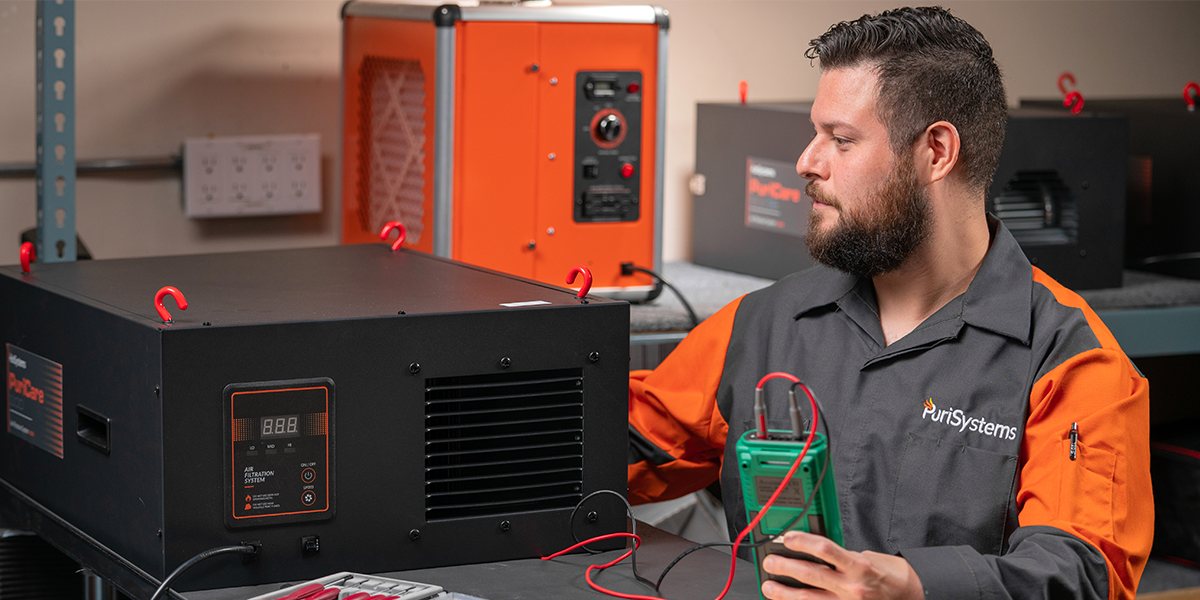Have you ever thought about the air you breathe indoors? It's easy to overlook, but the quality of the air in your home or workplace can have a significant impact on your health and well-being. This is where air filtration systems come into play. In this post, we'll explore the different scenarios where air filtration systems can be used and the many benefits they offer. By the end, you'll have a clear understanding of why these systems are so important and how they can make a positive difference in your life.
Understanding Air Filtration Systems
Let's start with the basics. Air filtration systems are designed to improve indoor air quality by capturing and removing harmful particles, odors, and pathogens. These systems work by pulling air into the device, which then moves through a series of filters to remove dust, pollen, bacteria, and other particles before being circulated back into the rooms.
Scenarios for Using Air Filtration Systems
Residential Properties
If you're a homeowner, an air filtration system can significantly impact your indoor air quality and, by extension, your health. These systems are particularly beneficial for allergy sufferers, as they can capture dust, pollen, and pet dander, providing much-needed relief.
Commercial Buildings
In a commercial setting, air filtration systems are essential for creating a healthy and productive work environment. By prioritizing the well-being of employees and maintaining clean indoor air, these systems can contribute to a more efficient workplace.
HVAC Systems
Air filtration systems are often integrated into HVAC systems to prevent air contaminants from entering the property. By doing so, they help maintain the proper functioning of HVAC systems and prolong their lifespan.
Benefits of Air Filtration Systems
Improved Air Quality
One of the most significant benefits of air filtration systems is the improvement in indoor air quality. By removing harmful particles and pathogens, these systems can reduce the risk of airborne illnesses and create a healthier living or working environment.
Health and Productivity
For individuals with allergies or respiratory issues, air filtration systems can provide much-needed relief. Additionally, in a commercial setting, these systems can contribute to employee well-being and efficiency by maintaining clean indoor air.
Protection and Maintenance
Air filtration systems play a key role in protecting HVAC systems and removing odors and gases from indoor air. This not only contributes to a healthier environment but also helps maintain the efficiency of HVAC systems.
Considerations When Purchasing an Air Filtration System
When it comes to purchasing an air filtration system, there are a few key considerations to keep in mind. You'll want to think about the types of filters available, the sizing and capacity of the system, as well as the maintenance and longevity of the system.
When choosing an air purifier for your home, there are several key features to consider to ensure that you select the most suitable model for your needs. Here are the essential features to look for:
1. Type of Air Filtration Technology
HEPA Filters: Look for air purifiers with High-Efficiency Particulate Air (HEPA) filters, which can capture 99.97% of particles as small as 0.3 microns, including dust, pollen, and pet dander.
2. Design and Ease of Use
Consider the design of the air purifier and its user-friendly features, such as intuitive controls and easy-to-replace filters.
3. Noise Level
Check the noise level of the air purifier, especially if you plan to use it in bedrooms or other quiet areas. Some models offer a "whisper-quiet" mode for minimal disruption.
4. Energy Consumption
Look for energy-efficient models or those with an Energy Star certification to minimize long-term operating costs.
5. Cost of Maintenance
Consider the ongoing costs of filter replacements and factor this into your decision-making process.
6. Additional Considerations
Room Size: Ensure that the air purifier is suitable for the size of the room where it will be used. Some models are designed for small rooms, while others are more powerful and suitable for larger spaces.
Air Quality Indicators: Some air purifiers feature built-in air quality indicators that provide real-time feedback on the air quality in your home, helping you monitor and manage indoor air pollution levels.
Filter Replacement and System Upkeep
Maintaining your air purifier regularly will help it last longer. Neglecting maintenance can lead to a reduced lifespan and overall performance. Most experts recommend changing the air filter in HVAC systems once every 90 days, or three months, to ensure optimal performance and prevent issues like increased energy costs and health risks.
Expected Lifespan of Different Systems
The lifespan of an air purifier can vary depending on several factors, including the quality of the device, frequency of use, and the type of filtration system it employs. On average, air purifiers can last between 5 and 10 years. However, well-built devices with high-quality materials tend to last longer compared to cheaper, low-quality alternatives. HEPA filters, known for their effectiveness in removing airborne particles, typically have a longer lifespan compared to other types of filters.
For HVAC air filters, the lifespan varies by model, but in general, most disposable air filters last three to 12 months. The thicker the filter, the less often it needs to be changed. By prioritizing these features, you can make an informed decision and choose an air purifier that best meets your specific needs and preferences.
Air filtration systems are a valuable addition to any indoor environment. Whether in a residential or commercial setting, these systems offer a wide range of benefits, from improving indoor air quality to protecting HVAC systems and enhancing overall well-being.
If you're looking to prioritize your health and create a cleaner indoor environment, contact the experts at Alorair Crawlspace. They can help you choose the right unit that will fit the size and dimensions of your home or commercial building.













